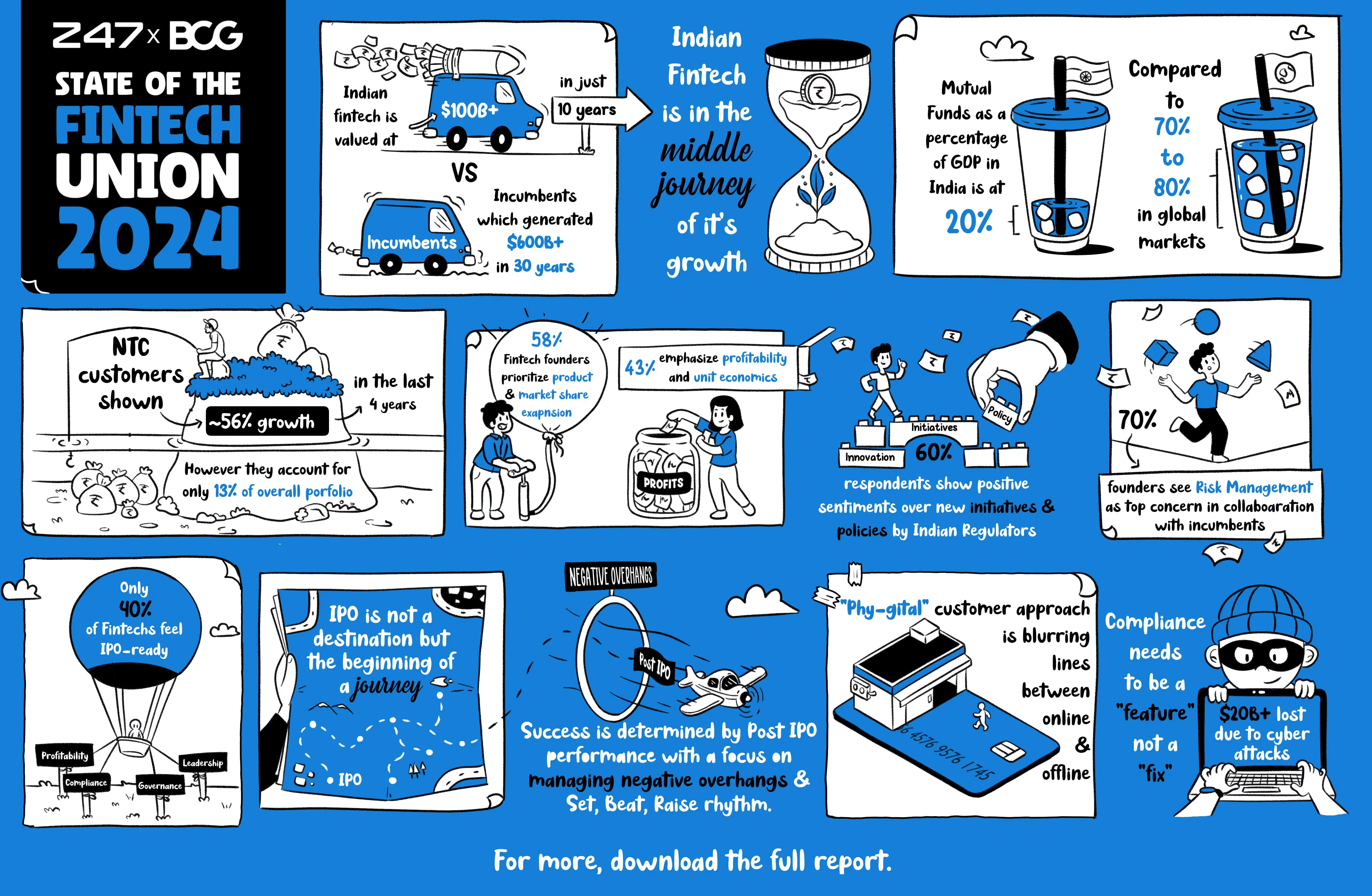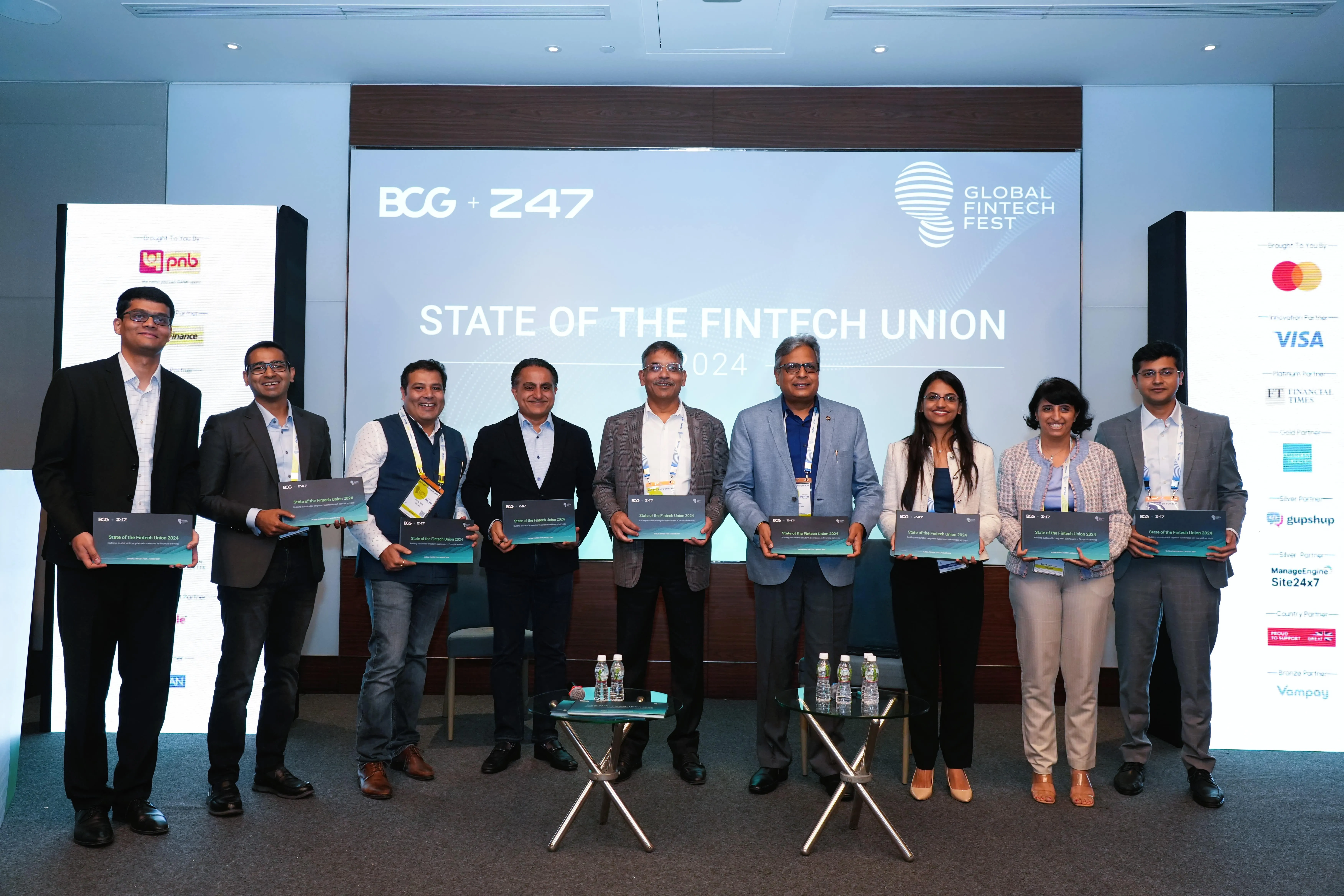
State of the Fintech Union Report 2024 by Z47 & BCG

Mumbai, Thursday, 29th August 2024: The Indian fintech sector has solidified its global leadership, ranking as the third-largest by the number of companies and demonstrating strong five-year growth. This underscores the resilience and innovation of Indian startups, as detailed in the "State of the Fintech Union 2024" report, released today by Z47 (fka Matrix Partners India) and Boston Consulting Group at the Global Fintech Fest 2024.
The report surveyed over 60 leading founders and CXOs across the fintech ecosystem to provide an in-depth analysis of the sector. It emphasizes how leaders can drive growth, improve strategic decision-making, and ensure a sustainable development path for the Indian fintech industry.
"The Indian fintech ecosystem is in its 'middle journey,' with challengers having created over $100B in value, compared to $600B+ in market cap from incumbents. The penetration of financial services will continue driving growth for the ecosystem, compounding value across all categories. This year's report highlights several interesting shifts, including an emphasis on the phy-gital user journey to serve 'Bharat' and a 2X focus on profitability and governance. At Z47, we remain confident that the fintech ecosystem is emerging stronger and will create scaled public market institutions." shared Vikram Vaidyanathan, Managing Director, Z47 (fka Matrix Partners India).
"The Indian Fintech ecosystem is maturing with remarkable resilience, as traditional financial institutions and Fintechs increasingly converge. Strategic adoption of new technologies and expansion into Bharat are unlocking significant growth opportunities, particularly in unsecured retail lending and mutual funds distribution. This year’s report shows founders are twice as confident in profitability, governance, and infrastructure security—crucial for sustainable financial inclusion. With over 20 unicorns and many soonicorns, large-scale liquidity events are imminent as 20-30% of PEVC investments near their end. A strong equity story, talent density, and post-IPO sustainability will be key as India emerges as a global fintech leader." said Vivek Mandhata, Managing Director & Partner, BCG India.
Section 1: State of the Indian Fintech Market
Growth Drivers: The number of fintechs has quadrupled in the last four years; a 3x increase in unicorns and soonicorns in the same period.
Low Penetration of Financial Services:
• Unsecured retail lending penetration is at ~10% (of the population) compared to 90-120% globally.
• Mutual fund penetration is at ~20% (as a percentage of GDP) compared to 70-100% globally.
Current Ecosystem:
• Having generated over $100 billion in value over the last decade, the Indian fintech ecosystem is in its "middle journey."
• The ecosystem is poised for further exponential growth, as seen with incumbents that have created $600+ billion in value over the past 3-5 decades.
Section 2: Voice of the CXOs
Profitability Focus:
• A survey of over 60 founders and CXOs reveals a shift towards profitability and unit economics.
• Surveyed founders and CXOs are optimistic about fintech profitability, with 45-50% of respondents believing fintechs will be profitable in the next two years (compared to ~20% in 2022).
Governance and Compliance:
• Improved governance frameworks, with 28-33% of respondents believing fintechs are now on par with incumbents (compared to ~20% in 2022).
• Fintechs should embed compliance in product design and build a fraud-resistant, secure architecture.
• Compliance as a "Feature," not a "Fix": Stricter compliance measures are being recognized as key differentiators for long-term stability and consumer trust.
IPO Readiness:
• Building sustainable companies with strong leadership, compliance, and governance is crucial for IPO readiness.
• Only 40-60% of respondents feel fully prepared for an IPO.
Technology and Risk Management:
• Addressing tech debt and preparing for fraud and cyber risks are critical to strengthening governance.
• Increased investments in tech and monitoring solutions are necessary, given the $20+ billion lost globally in cyber and digital attacks over the last 20 years.
Section 3: Journey to IPO and Beyond
Timelines to IPO:
• Indian startups typically take 3.5 to 4 years to go public after reaching unicorn status.
• Over 35 mature fintech firms (valued at $500M+) are noted, up from 13 in 2020, with multiple fintechs potentially looking to IPO in the next few years.
Post-IPO Performance:
• Approximately 70% of fintechs listed in India experience a decline in share prices within six months of listing.
• Effective management of scaling challenges and profitability is crucial for continued value creation.
IPO Strategy:
• Success in IPOs requires defining a strong equity story that highlights both the company and its stock.
• Leveraging a "Set, Beat, Raise" rhythm is essential to drive continued value post-IPO.
Section 4: Opportunities for Founders to Unlock Growth
Emerging Trends:
• Payments: B2B payments are awaiting their "UPI" moment of disruption, with an estimated $1.8 trillion opportunity in cross-border payments by 2027.
• Lending: India's retail unsecured loan penetration is only 9%, significantly lower than countries like the USA (259%) and the UK (173%), highlighting substantial room for growth.
• WealthTech: India's mutual fund investor count has doubled since March 2020, from 9 crore to 18 crore, but penetration remains low (~20%) compared to other countries (70-100%). WealthTechs can leverage technology-led solutions to tap into this segment.
• InsurTech: InsurTechs can address under-penetrated segments such as self-employed individuals and Tier 2 cities. Additionally, non-life insurance in India, as a percentage of premium to GDP, is at ~1% (vs. ~4% global average), providing another opportunity for InsurTech.
Phy-gital Approach to Business Building: "Phy-gital" journeys with offline touchpoints help fintechs reach previously underserved customers, allowing for higher-value transactions built on trust.
Bharat and Beyond: The next wave of penetration-driven growth is expected to come from Tier 2 cities and beyond (e.g., 70% of insurance consumption is projected to come from Tier 2+ cities by 2030).
About Z47 (fka Matrix Partners India):
Founded in 2006, Z47 (fka Matrix Partners India) invests in companies targeting the Indian consumer and enterprise market. The firm has invested in several category-leading companies such as Razorpay (Payments), Five Star Business Finance (SME Lending), OneCard (Mobile-first credit card), Ola (Mobility), Ola Electric(Electric Vehicles), Dailyhunt (Local language platform), OfBusiness (B2B commerce, fintech), Oxyzo (Tech-enabled smart financing), Captain Fresh (B2B seafood marketplace), Country Delight (D2C dairy & fresh foods brand), GoKwik (E-commerce enablement platform), Jupiter (Neobank), MoEngage (Customer engagement platform), Mswipe (Mobile POS), Stanza Living (Tech-enabled student housing platform) and Zupee (Skill-based gaming) among others. The firm has advisory offices in Bangalore, Delhi and Mumbai. Further information is available at https://www.z47.com/podcast. To know more about our investment philosophy & ideologies, check out the #Z47Podcast series.
About Boston Consulting Group:
Boston Consulting Group partners with leaders in business and society to tackle their most important challenges and capture their greatest opportunities. BCG was the pioneer in business strategy when it was founded in 1963. Today, we work closely with clients to embrace a transformational approach aimed at benefiting all stakeholders—empowering organizations to grow, build sustainable competitive advantage, and drive positive societal impact.
Our diverse, global teams bring deep industry and functional expertise and a range of perspectives that question the status quo and spark change. BCG delivers solutions through leading-edge management consulting, technology and design, and corporate and digital ventures. We work in a uniquely collaborative model across the firm and throughout all levels of the client organization, fueled by the goal of helping our clients thrive and enabling them to make the world a better place. For more information, please visit https://www.bcg.com.




